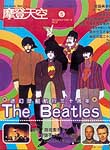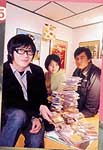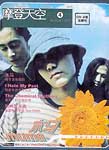|
Rising up next to Beijing's West
Third Ring Road like a massive sewage pipe on Viagra,
the China Central Television Tower dwarfs the anonymous
highrises and gray, anomie-inducing apartment buildings
around it. Two kilometers north of the tower are the
offices of a very different kind of media company from
the state-owned Goliath whose anodyne programs jam up
the airwaves all over China: a small music production,
printing, and publishing company known as Modern Sky
Records.
The Modern Sky office
is housed in a small one-storey building inside the
yard of a residential apartment complex just off the
Third Ring Road. To get there, you have to walk through
an iron gate, past a dusty building site and into a
dilapidated brick structure containing several desks,
a water dispenser, anarchic piles of calendars and advertising
flyers and - usually - several young Chinese men with
long hair. Following the longhairs behind an architecture
of cardboard boxes, you will find a staircase leading
down to an underground room, softly lit and furnished
with bleached-wood furniture and chrome. A gaggle of
designers sit at an L-shaped desk, manipulating images
on a row of aqua-colored Apple computers. They won't
look up as you walk past them into another room, furnished
with a desk and cluttered with stacks of CDs, cassettes
and printed papers. If you walk through this room, you
will arrive at the underground heart of Modern Sky,
where you will probably see a toy train set on the floor
and a man with a very cute mole on his left cheek sitting
on a beanbag while he softly strums an electric guitar.
This man is 30 year-old
Shen Lihui: artist, designer, lead singer of popular
funk-pop band Sober (Qingxing) and mastermind of a small
media empire in the making. With his hip, art-yuppie
clothes and thick black spectacle frames, he is reminiscent
of a young Richard Branson in the early days of Virgin
Records. The comparison is valid beyond appearances.
Shen has transformed his knowledge of what appeals to
young Chinese urbanites - garnered as an art student
and musician - into an innovative company that releases
more contemporary Chinese rock music than any other
Mainland-based record label, publishes a music magazine
with nationwide distribution, and operates one of Beijing's
most popular live-music venues, the No. 17 Bar in Sanlitun.
Shen studied at the prestigious Beijing Arts and Crafts
Institute (Beijing Gongyi Meishu Xuexiao). Shortly before
his graduation in 1990, he and some classmates formed
the band Sober. After graduation, he worked for a year
at the China Recording Company designing album covers.
A year later, sick of the daily grind of designing folk
music cassette covers, he started his own design and
printing company. Shen had no outside investment nor
experience doing business. The company took a few years
to turn a profit, but by 1994 there was enough spare
cash to branch into a field that Shen was passionate
about: music publishing. His printing company cooperated
with a small record company to produce and distribute
a compilation featuring lesser-known Chinese rock bands
(Rock '94 - Yaogun '94).
The album sold well enough to convince Shen that his
printing company could successfully produce and market
rock records. He spent his musical energy during the
next three years composing, performing and producing
the debut record of his five-man band Sober. Their record
was also the first album released under the newly-formed
Modern Sky label, attached to Shen's printing company.
Entitled Hao Ji Le?! (It's Great?!), the album was released
in December 1997 and sold well both on the Mainland
and in Taiwan and Hong Kong. The success of the record
brought public recognition to the Modern Sky name in
the Greater China music market, and gave Shen the production
and marketing experience necessary to continue cutting
and selling records.
Sober's record was followed in June of 1998 by a compilation
entitled Modern Sky 1. One track by Sober helped to
sell the compilation, but the other artists were bands
with no recording history, unknown outside a small group
of music fans in Beijing. A relaxed attitude toward
music publishing on the part of political authorities,
and an increasingly enthusiastic fan base allowed the
company to continue releasing records one after another:
electronic band Supermarket (Chaojishichang) came out
with The Look (Mo Yang) in August of 1998, followed
by New Pants' (Xin Kuzi) eponymous debut album in December
of last year.
Since then, Modern Sky has released 17 records, and
started an 'alternative' label - Badhead Records - to
release music that appeals to what Shen calls the 'underground'
by bands like noisy rock poets NO and alternative folk-rocker
Hu Mage.
But the project that has put Modern Sky firmly on the
Chinese music map is their monthly magazine, simply
called Modern Sky Sound Magazine (Modeng Tiankong Yousheng
Zazhi). Also known as New Music New Life (perhaps because
it is always useful in China to have two names), the
magazine has already won legions of readers ranging
from high-school dropouts who have just picked up their
first bass guitar to music industry professionals, to
foreign correspondents trying to keep up on Beijing's
fast-changing youth culture.
Each issue of Modern Sky - the fifth one has just been
published - is a three part, plastic-wrapped package
consisting of a 48-page large format magazine, a small
supplementary pamphlet, and most importantly, a compilation
album on CD and cassette. Some of the articles in the
magazine are about the music on the compilation album,
but there are also stories about other music-related
topics as well as book and film reviews, cultural commentary
and occasionally short fiction. Stories that don't fit
into the large magazine are printed in the pamphlet,
but the raison-d'etre of the pamphlet is technical rather
than editorial. The larger magazine is printed on paper
cut from standard sheets. The left-over bits of paper
are an odd size and would be thrown away if they were
not used to make the pamphlet. The compilation album
contains a mix of new foreign and local rock music.
Each month, about half of the local music section consists
of songs by mainstream bands who may already have record
contracts; the other half is devoted to 'underground'
bands. Many of these bands are obscure, either because
they are not from Beijing and so have no access to the
Mainland's biggest music scene, or because their music
is just too bleeding edge to be popular.
This music distribution system is unprecedented in China.
A magazine called Music Heaven run out of Guangzhou
has been releasing a bimonthly magazine/cassette with
foreign pop songs since 1993, but Modern Sky's compilation
records are the first opportunity for Mainland listeners
to buy, on a regular basis, new music that is considered
'alternative' even in the West. Moreover, the local
bands represented on the compilations range from relatively
well-known performers on the Beijing circuit like Fly
and Chen Dili to raw underground bands like AZ Cat -
a Hebei province ensemble nobody had even heard of let
alone sampled before their inclusion on Modern Sky 4.
Bands like AZ Cat can get their songs distributed nationwide
with Modern Sky magazine, an opportunity for which aspirant
musicians in highly-developed Western music markets
would gladly amputate picking fingers.
The CD compilation is
vital to the whole magazine for another reason: Modern
Sky is produced with a music publishing license rather
than a print publishing license. This means that Modern
Sky has not had to negotiate the excruciating and often
deadend process of publication approval from the State
Press and Publishing Administration, a government department
not known for its tolerance of alternative lifestyles
or magazines about rebellious youth culture. Modern
Sky is not alone in using such creative means to publish
on the Mainland - in recent years many start-up newspapers
and small magazines have used the quasi-legal vehicle
of 'advertising licenses' to outflank China's conservative
cultural czars.
Modern Sky magazine has
a print run of 30,000 per issue. Of these, 5,000 are
distributed with a CD (sold for RMB19.80) and the remainder
with a cassette (RMB15). "We want this music to be available
to ordinary people," Shen says, "so the price has to
stay as low as possible."
The magazine's editor-in-chief is 27 year-old Beijing
native Tao Ran. He says the biggest difficulty in producing
the magazine is that there are very few people in China
who can write knowledgeably about rock music. Most of
the articles about foreign rock music are provided by
a Hong Kong company that produces a similar magazine
to Modern Sky called Music Colony (Yinyue Zhimindi),
but Tao is not enthusiastic about music criticism from
Hong Kong either. "They write differently from the way
we do on the Mainland, and their prose is often awkward
for us to read," he laments. But Tao remains upbeat:
"We want our magazine's content to be specialized, but
popular. I think we already have a fresh style. If we
can increase our distribution, we will affect the lives
of a lot people."
Modern Sky founder Shen is even more ambitious. He is
personally modest - he refers to future projects as
"our" ideas, and claims that he just sits in the back
room playing guitar, "while everyone else works hard."
But he has big plans for Modern Sky. He hopes to set
up a film and music video production house, and talks
enthusiastically about a "very, very big" Internet project
that the company expects to be involved in next year.
When asked about Modern Sky's rivals - such as Jingwen
Records in the recording business and Pop Songs magazine
in publishing (see sidebar) - he claims to welcome competition.
"The more magazines and music of this kind available
in China, the better for all of us," Shen declares.
"I hope we are all contributing to a revitalization
and internationalization of Chinese culture, and I welcome
anyone who adds to this."
Modern Sky is a typical
post-modern PRC paradox. Their work space and subject
matter are underground, but the music and magazines
they publish are commercially successful. Shen Lihui
has laid the foundations for what may one day be a media
empire. Then again, it might not - instability is inherent
to the publishing and music business, especially in
China. But listening to Shen describe his projects with
boyish enthusiasm and a can-do candor makes Modern Sky's
future and indeed that of China's media industry seem
hopeful.
Modern Sky Magazine Subscription
Details

Modern Sky - RMB19.80 per issue (with
CD), RMB15 per issue with tape (plus RMB3 to order a
catalogue)
Mailing Address:
P.O.Box 2816, Beijing 100044
Email: modernmaga@hotmail.com
http://www.modernsky.com
Subscription & Mail Order Department
Tel: 6847-5087, 6847-4598, 6848-3778 ext. 29/30
Editorial Department
Tel: 6847-5087, 6847-4598 Fax: (010)6847-4859
Mainland Alternative Music Publications Modern Sky is
not the only voice of China's fledgling rock music scene.
Below is a list of other publications that cover alternative
music and youth culture
Electric Ark
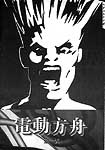
Published by the same people who
run New Ark bookstore, their one and only issue came
out in the winter of 1998. The black and white magazine
is an introduction to the origin of underground music
in the west: Henry Rollins, Tom Waits, the New York
Dolls etc. RMB15 per issue or free for club members
of the bookstore (RMB30 annual membership fee, includes
bookstore discounts). New Ark Book Store carries most
Mainland music publications, as well as a small selection
of CDs and hard-to-find books on youth topics. Address:
New Ark Bookstore 1 A, 1/F, Bldg 24, Zhanlan Lu, Xicheng
District 100037 Tel: 6835-0801, 6832-8997 Opening hours:
9 am-8 pm
Music Colony
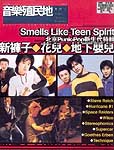
The Hong Kong biweekly counterpart
to Modern Sky, Music Colony has a similar layout and
design to Modern Sky but focuses more on the international
scene, with occasional features on Mainland rock.
Mailing Address: P.O.Box 60062, Tsat Tsz Mui Post Office,
Hongkong
Fax: 2516-7778
Subscriptions: Tel: 2563-8397 Email: mcb@netvigator.com
http://www.netvigator.com
HK$15, or RMB18.8 per issue Available in Beijing at
the following stores:
New Ark Bookstore (see address above)
Jinghuatong Audio and Video Center
51 Xinei Dajie, Xicheng District
Tel: 6255-3834
Pop Songs
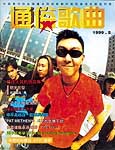 
One of the first music magazines on
the Mainland to feature local bands and introduce international
pop music. The monthly magazine offers reviews of new
releases, lyrics and musical scores of popular songs.
In circulation since 1987, its focus moved away from
pop to rock music in 1998. RMB6.6 per issue 44 Tiyuzhong
Dajie, Shijiazhuang, Hebei Province 050021 Tel/Fax:
0311-5815-028
Punk Era This was a monthly magazine featuring foreign
rock and punk bands. It has been out of print since
September, but plans to resume publishing in the new
year. P.O. Box 015A, Guangyuan Zhong, Guangzhou, 510405
Email: gzmusic@publicl.guangzhou.gd.cn Tel:(020) 8638-3691
Start From Scratch
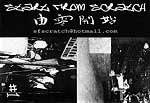
A bilingual music magazine featuring
punk rock and hardcore bands in Hong Kong and on the
Mainland. Includes reviews of local and international
record releases and Hong Kong distributors' price lists.
Mailing Address: Start from Scratch c/o Riz Farooqi
B3 15Fl. Hankow Ct. Ashley Road, Kowloon, Hongkong Email:
sfscratch@hotmail.com
Music Heaven
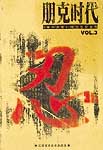
Published bimonthly since 1993, the
magazine focuses on mainstream music with an occasional
feature on Mainland alternative rock. Every issue includes
a CD or cassette tape featuring foreign pop music
RMB13 per issue
Mailing Address: P.O.Box 015A, Guangzhongyuan Post Office,
Guangzhou City, Guangdong Province 510405
Tel: (020) 8663-0010, 8662-1299
Fax: (020) 8662-1299
http://www.gotitmusic.com
Subscribe in Beijing at: Dalian Ligong Publisher 256
Book Market, Jintai Lu, Chaoyang District
Tel: 6508-2081
|


